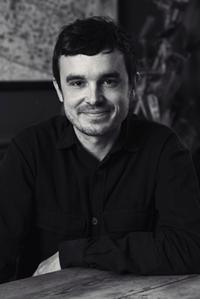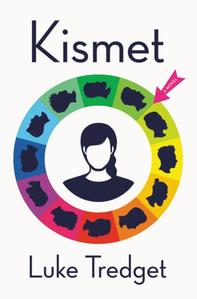
|
|
| photo: Nathan Small | |
Kismet raises important questions about the influence of social media and our dependence on it. What did you hope to accomplish when you set out to write the book?
The main theme I wanted to write about is the pressure that many people feel, myself included, to make their lives extraordinary or perfect. I feel that social media enhances this, because it constantly serves up images of people we know that seem to be living more exciting, idealized lives. I wanted to take this one step further, and imagine a world where social media actually helps people achieve the life of their dreams. I then honed in on the idea of a matchmaking app that people trusted unthinkingly, ahead of their own instinct or analysis. By writing Kismet I suppose I wanted to explore the dangers (and benefits) of having big data interfere in our private lives in this way, and especially the threat it could pose to our own decision making.
Where did you get the idea for the Kismet dating app?
The technology and format for the app in the book is very much based on the way dating apps are developing in the real world, so it didn't take a huge leap of my imagination. There are already apps that link you with people based on where you live or your current location, and others that show compatibility as a percentage score. The major difference is that Kismet works by harvesting the totality of someone's online data and behavior. At the time of writing, this seemed like a novelty, but just a few weeks before publication it was announced that Facebook would be launching a dating platform--the amount of data they will be able to draw on will be massive, and basically means that the real world has caught up with my fictional app!
You write so effectively from the female perspective--Anna is totally relatable. Can you share with us the secret to your authentic representation of Anna and her inner world?
Great to hear you say this, as it was obviously one of the major challenges of writing the book! My approach was to leave it to my intuition in the first instance and not consciously try to map out definitively "female" thoughts or actions. If I'd done that, I would have crippled myself. So I just wrote it based on my own instinct, and then had several really smart women tell me where I'd gone wrong! My agent, editor, copy editor are all women. There were a few things they suggested I change, but on the whole it seemed to be okay, and I think this reinforced something I believed anyway--that men and women aren't as different as we are sometimes encouraged to believe.
 Anna's interest in Geoff is understandable; he's suave and attractively enigmatic. Was his creation inspired by a famous celebrity or someone you know, or is he a figment of your imagination?
Anna's interest in Geoff is understandable; he's suave and attractively enigmatic. Was his creation inspired by a famous celebrity or someone you know, or is he a figment of your imagination?He is actually almost a complete fictional construct, though I was thinking a little bit about characters like Julian Assange--people who set themselves against mainstream authorities in a dramatic and subversive way. The only difference is that Geoff has never achieved anything like the fame and notoriety that Assange has, and therefore is a bit disgruntled and eager to make his own mark somehow. I also had to make him incredibly handsome and well-traveled, so that Anna's attraction to him was more believable.
It's fascinating to juxtapose your work as a Red Cross international response director with your literary accomplishments. They are two very different vocations. Did one lead to the other, and if so, which came first?
They certainly are very different, but in fact one did lead to the other. Several years ago, I used my experience at the Red Cross to enter a journalism competition, writing about climate change in Bangladesh. My article was shortlisted and I was sent by the Guardian to Africa to write another article, this time about refugees, which was then published. The experience gave me the confidence to invest more time in my writing, including trying fiction. I joined a creative writing class, and basically never looked back! Since then, I have tried to balance writing and my Red Cross work, though I did take a year off to study an M.A. in Creative Writing and write the first draft of Kismet.
With Kismet's successful U.K. launch and the much anticipated U.S. publication, do you plan to continue your dual careers?
That depends how well the book does! At the moment it isn't an option, as I have a young daughter and have recently brought a house, so it would be a risky time to quit my dependable income! Also, if I left my job, I think I would miss the way that it makes my writing, by comparison, feel like my hobby and my passion. If I were to write full time, some of this charm, I fear, might be lost. I also think that being in a completely different realm of life--e.g., a real-world office--helps give you material and perspective for writing fiction. So for the time being, I'll definitely carry on the dual path.
Do you have any advice for aspiring writers?
The thing that benefited me the most was joining writing classes and ultimately taking a writing M.A. It wasn't the teaching itself--though of course this can be useful--but meeting other students who became my writing friends and peers. Having this support network can be absolutely invaluable, as they are the best placed to give feedback, encouragement, deadlines and maybe even the uncomfortable truths that are needed to make your writing as good as it can be. --Shahina Piyarali, writer and reviewer

